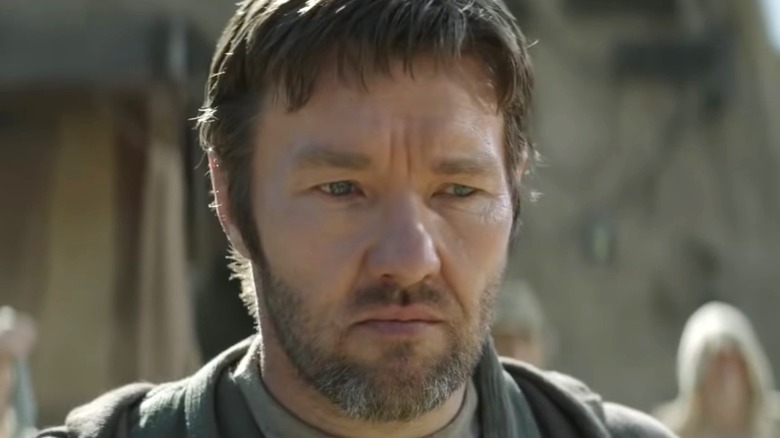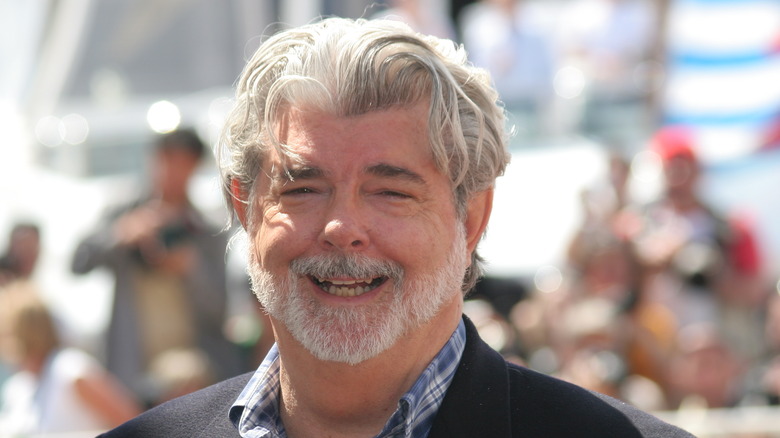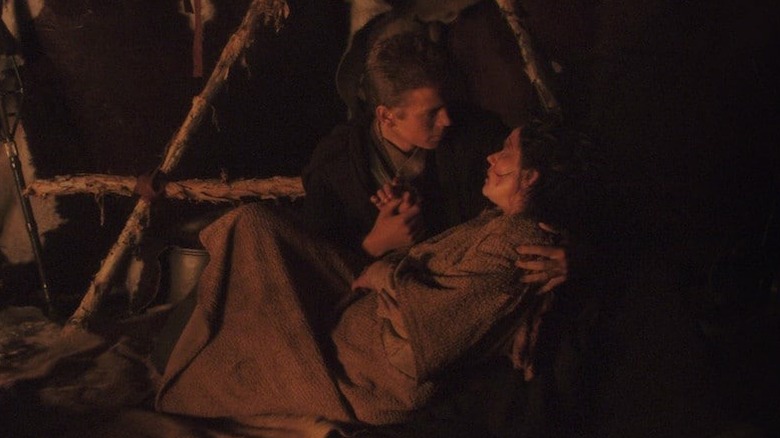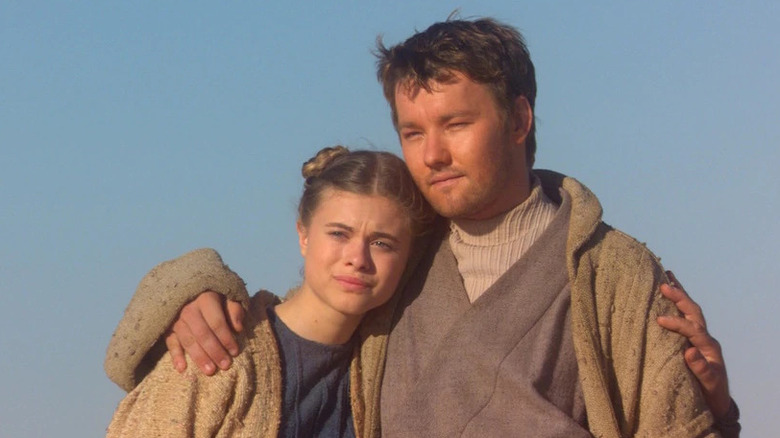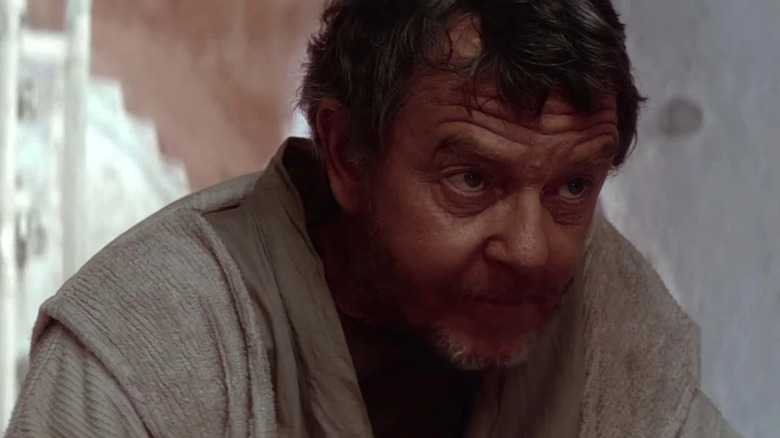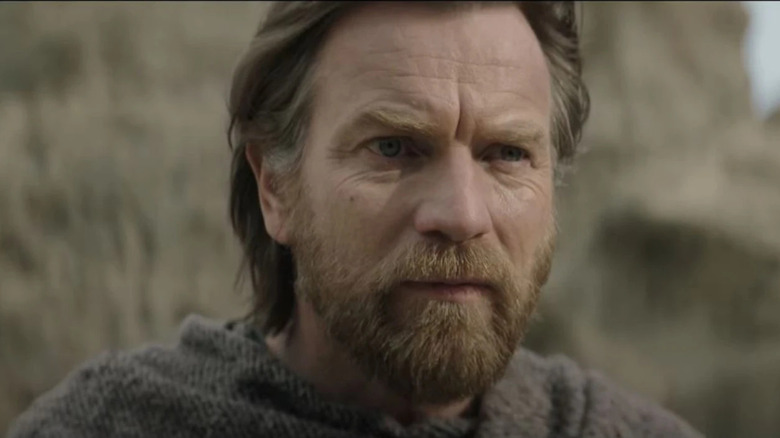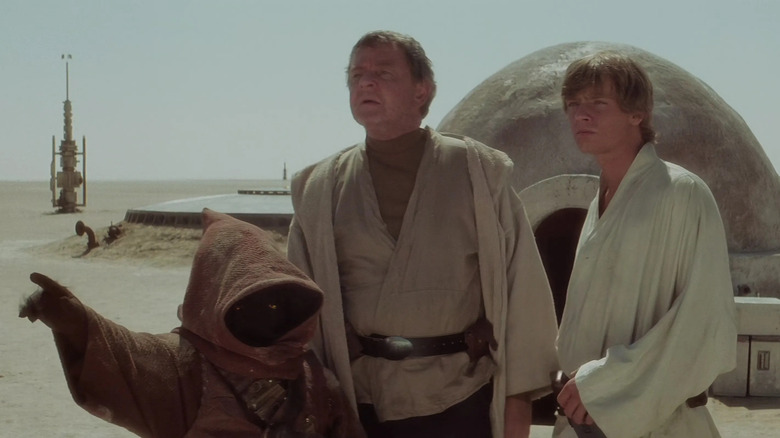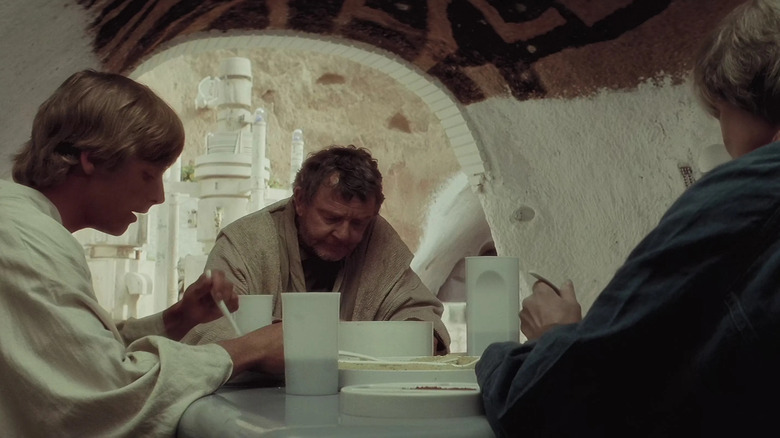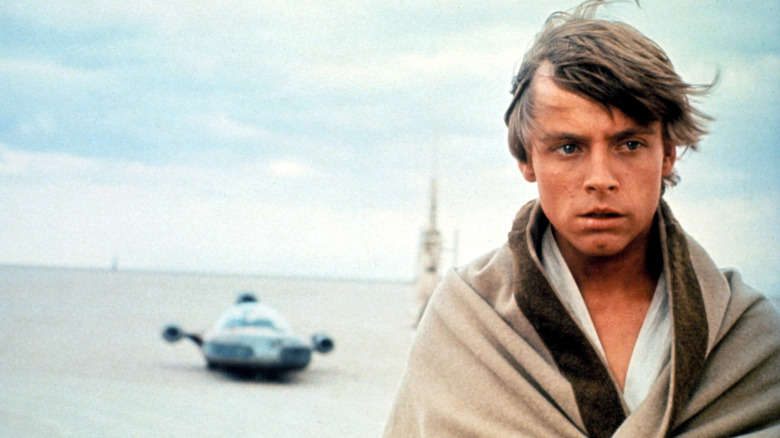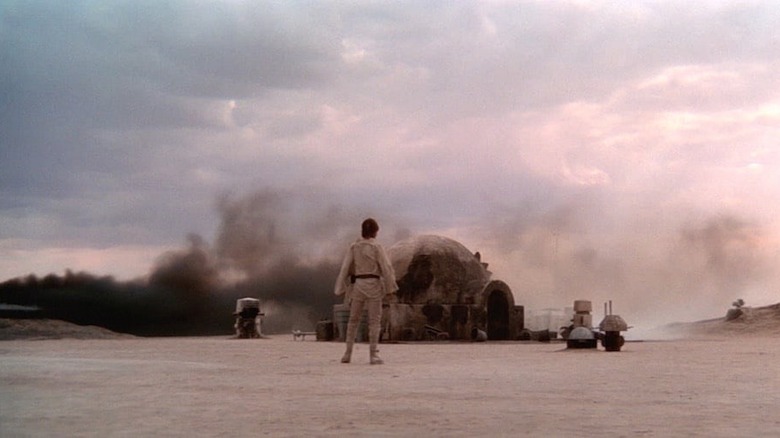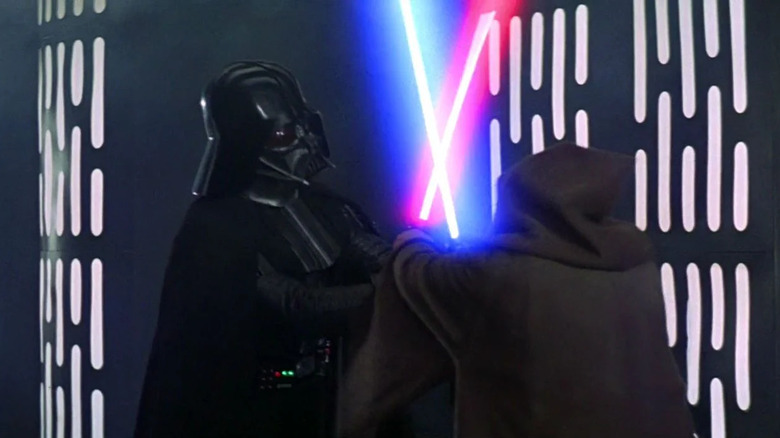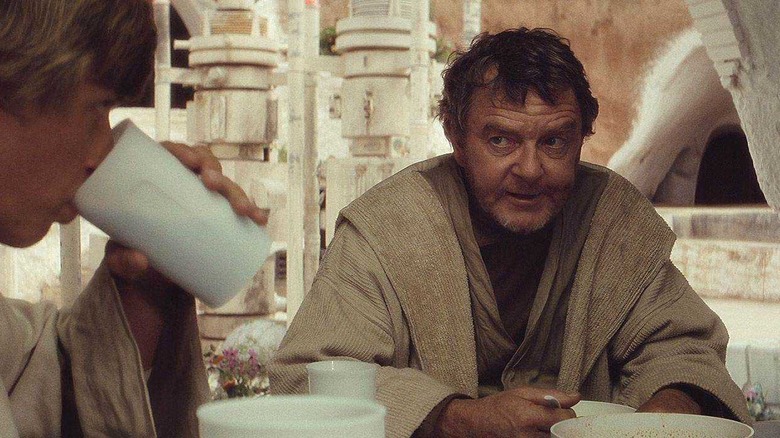The Untold Truth Of Owen Lars
Poor Owen Lars. Not only does he lead a hardscrabble life on Tatooine raising someone else's kid, moisture farming while holding off the Empire and the Hutt crime syndicate, he only gets about four and a half minutes of screen time in 1977's original "Star Wars." We learn a little more about the man Luke Skywalker calls Uncle Owen in the prequel trilogy, and more information is provided by books and comics. Still, this somewhat reluctant unsung hero of the Rebellion has never really gotten his due.
That all changes with the Disney+ series "Obi-Wan Kenobi," in which Joel Edgerton reprises his role as the younger Owen. "Star Wars" fans finally get to see a live-action version of Owen, Beru, and Luke's daily life on Tatooine in the years between the Empire's rise and fall. Owen Lars might not be an oft-cited favorite character. After all, he doesn't have Force powers or even a cool job, and he spends almost his whole life stuck on the same desert planet. Still, the man who raised Luke Skywalker is one of the most significant players in the saga. The Rebel Alliance never could've prevailed, and "Star Wars" simply couldn't have happened without his contributions. It turns out that Uncle Owen — like Anakin and Luke — has a fascinating and ultimately tragic biography of his own.
His backstory was almost very different
It took years for "Star Wars" to get from George Lucas's brain to the big screen, and in that time, many of the director's original ideas underwent some pretty drastic changes. The nonfiction book "The Making of Star Wars: The Definitive Story Behind the Original Film" details how the scripts evolved over three major drafts. Though his part ended up being relatively small, Uncle Owen was always intended to be part of the saga.
In Lucas's rough draft, he and his wife, Beru, are anthropologists stationed on Yavin. This might be a nod to the career Lucas may have ended up with if he hadn't chosen to make movies instead. Lucas enrolled in Modesto Junior College, where he studied anthropology, among other subjects. He quickly transferred to film school at the University of Southern California, but his involvement with the "Indiana Jones" franchise makes it clear that he never really lost interest in the subject.
In the second draft, Owen is a Jedi who, along with Beru, is tasked with caring for a set of twins — Biggs and Windy — whose roles in the "Star Wars" universe ended up getting cut down to background characters. During this draft, however, Lucas introduced the idea of the Lars taking in a young, orphaned Luke Skywalker. By the third draft, Owen Lars becomes the humble moisture farmer we know him as today. However, "Star Wars: The Essential Reader's Companion" mentions that Lucas toyed around with other angles for the character, including a twist that Owen and Obi-Wan were brothers.
Like Anakin, he lost his mother at a young age
Owen Lars may have spent the majority of his life on Tatooine, and that's where his lineage hails from, but his own story begins elsewhere in the galaxy. Owen was born to Cliegg Lars, who we see in "Star Wars: Attack of the Clones," and his first wife, Aika, who does not appear in the films. According to the "Star Wars Character Encyclopedia: Updated and Expanded," the family of three lived on the Core World planet of Ator until she died of an unspecified cause.
Cliegg and Owen return home to the family's ancestral moisture farm on Tatooine, where the father teaches his son the trade. "Star Wars" canon doesn't specify how old Owen is at this point, but these events transpired before he met his eventual wife, Beru, and early enough for him to have considered Shmi Skywalker a stepmother. Cliegg frees Shmi from Watto's slavery, after which point she marries him and returns to the homestead. Owen learns that he has a stepbrother, Anakin, who he only meets under unfortunate circumstances.
When a band of Tusken Raiders captured Shmi, Cliegg gathers 30 farmers to rescue her. Nearly all are killed in the effort. Sensing his mother's distress, Anakin and Padme arrive on Tatooine, at which point the young Jedi goes to look for Shmi. He finds her in time to share a final moment with her, then slaughters the Tusken Raiders and returns to the Lars' moisture farm with her body. Owen, still a young man, has to mourn the loss of a second mother-figure, then own his father, who dies of a broken heart shortly thereafter.
He and Beru couldn't have kids of their own
Owen Lars marries Beru Whitesun, a third-generation moisture farmer herself, and the young couple assumes management of the Lars homestead after Cliegg's passing. They expect to start a family and carry on their families' traditions, but sadly, they discover they aren't able to have children of their own, biologically speaking. In a short story from "Star Wars: From a Certain Point of View" written by Meg Cabot from Beru's perspective, we learn that Beru and Owen consider using the services of a fertility droid. There are some to be found at Mos Eisley, but Beru decides against it as Mos Eisley is too dangerous a place to order a drink, let alone to conceive a baby.
When Obi-Wan Kenobi approaches the Lars with the infant Luke Skywalker at the end of "Star Wars: Revenge of the Sith," both Beru and Owen have reservations. Beru suspects the miracle baby that suddenly appeared before her is too good to be true and knows that there is an inherent risk to taking a child associated with the Jedi. Owen has a strong distaste for the Jedi stemming from everything that has happened concerning his stepmother, Shmi, and his stepbrother, Anakin. However, Beru falls in love with the baby the moment Obi-Wan puts the swaddled Luke in her arms, and she insists that they raise him as their own.
After his terrible start in life — his mother's death, his father's assumed demise — Beru just wants to make Luke happy — although Owen fears he'll be too much like his father.
He disliked Obi-Wan and distrusted the Jedi
From what we see of Owen Lars and Obi-Wan Kenobi in "Star Wars: A New Hope," they're barely acquaintances and Owen doesn't hold Old Ben in high regard. In fact, he actively keeps Obi-Wan away from Luke as much as possible, and not without reason. Owen, Luke, and Obi-Wan appear together in a series of "Star Wars" comics from 2015 (Issues 7, 15, and 20 in particular) that take place roughly around the same time the "Obi-Wan Kenobi" TV series does. In those pages, we learn that Owen believes his stepbrother to be dead. He is angry with the Jedi for letting him fall to the dark side, and he directly blames Obi-Wan, who trained him.
In "Star Wars" #15, Owen accuses Obi-Wan of being the one who got Anakin killed. It's implied he suspects that Obi-Wan may even be the one who killed him. Though Owen accepts responsibility for the boy because Beru wants a family, he refuses to allow Obi-Wan to train him as a Jedi. "I'm not gonna let you warp the boy like you did his father," he says to Old Ben when the Jedi in hiding merely tries to help.
Owen's distrust of Force users goes back to the depression his stepmother, Shmi, suffered after the Jedi Order took her only son away from her. The Lars' chief concerns aren't the Empire or the Jedi. They only want to eke out a happy life with little Luke while avoiding the corruption and danger posed by the Hutts as much as possible.
Obi-Wan protected Owen from afar
Just because Owen tells Obi-Wan to stay away doesn't mean he listens. Surely Obi-Wan feels as much (if not more) responsibility for Anakin's son as Owen and Beru did, and he also holds out hope that the Skywalker line might still bring the prophesized balance to the Force and peace to the galaxy. Obi-Wan watches as Luke grows up and shows great Force-wielding potential and even finds a way to get him spare parts when he wrecked Owen's skyhopper. But of much greater importance, he protects Luke, Owen, and Beru from threats they didn't even know existed.
One plotline from the 2015 run of comics describes a crippling drought that strikes Tatooine during Luke's childhood. Jabba the Hutt seizes on the opportunity to collect a water tax, and he sends his thugs to rough up anyone who doesn't obey. Obi-Wan keeps Jabba's ruffians away from the Lars homestead. He even rescues a precocious Luke runs away from home to steal water when the supply runs low. Owen admits that he knows Obi-Wan is the reason his farm is the only one never attacked by Hutts or Tusken Raiders, but the Hutt syndicate eventually catches up with both of them.
Jabba sends the Wookiee Krrsantan, who also plays a part in "The Book of Boba Fett," after Owen when he realizes the Lars have been evading his tax collectors. Obi-Wan and Owen work together to fight him off and survive. In the end, they are both saved by Luke Skywalker, who is flying the skyhopper nearby when he wasn't supposed to be.
He taught Luke everything he knew
Owen doesn't permit Luke to train under Obi-Wan Kenobi, but he does give him an education that serves him his whole life. Luke's uncle teaches him everything he knows, not just about moisture farming (which Luke had little interest in), but also about hard work, discipline, self-defense, and mechanical engineering.
In one of a series of Webtoons published prior to "Star Wars: The Force Awakens," Uncle Owen teaches a still-very-young Luke how to use a blaster rifle in case Tusken Raiders ever return. Aunt Beru isn't thrilled about the idea, but Luke certainly is. Owen involves Luke in the purchase and maintenance of droids and also permits (if not quite encourages) his nephew to learn to pilot his equipment. Luke has access to a swoop bike, a V-35 Courier, a T-16 skyhopper, and an X-34 landspeeder, all of which he can operate and repair. Though Luke repeatedly insists he wants to get off Tatooine and do anything besides be a moisture farmer, Owen raises him to be a self-reliant individual and prepares him for a difficult future.
Finally, Owen's rejection of the Jedi and Sith and his ability to carve out a sense of right and wrong on his own likely had a profound impact on Luke Skywalker. After all, Luke never finishes his training with Yoda, choosing to fight at his friends' side instead. A learned skepticism of the Jedi may explain his mindset when we meet up with him again in "Star Wars: The Last Jedi." Though he's part-Anakin and part-Padme, Luke's also part-Owen and wouldn't be the man he becomes without his uncle.
He had a contentious relationship with his nephew
Though Owen Lars instills many values in Luke Skywalker and keeps him safe for the better part of 19 years, their relationship isn't always on the best of terms. For one thing, Uncle Owen plays the bad cop to Aunt Beru's good cop. He is the parental figure who forbids Luke from doing what he wants and doles out punishment when he doesn't listen, while Aunt Beru is there to comfort her nephew with blue milk after Uncle Owen scolds him.
Luke is a generally well-behaved and obedient child for the Lars, happy to help around the moisture farm, but his longing for something more gets him into trouble now and then. As is depicted in the "Star Wars" comics, he sneaks out and runs away from home on several occasions and his interest in racing worries Uncle Owen. As Luke matures and begins to remind Owen of his father, the man of the house finds himself putting his foot down more and more often. Luke is not allowed to race, have contact with Ben Kenobi, or follow his dream career path, even though Aunt Beru would sometimes argue in the boy's favor. This leaves Luke with the impression that his Uncle is too strict and unfeeling. Sadly, he never knew that Owen was only trying to save him from his father's fate.
He kept Luke from joining the Empire
Since Luke Skywalker is born into the Empire's reign, he wants to be what any little boy would've wanted to be when they grew up: an Imperial pilot. It seems ridiculous to imagine in hindsight, but young Luke desperately wants to go to the Imperial Academy, per Insider.
The Empire is never very popular among regular folks across the galaxy (at least not as popular as it needs to be). One can see in the sequel trilogy that some cadets (like Finn) are literally stolen and trained as child soldiers. Not all Imperial Academies are alike. Some families would want their offspring to graduate from the highest-ranking Academy branches and become officers, while other parents would see service as a threat. To be clear, Luke isn't necessarily pro-Empire. When C3PO brings up the Rebel Alliance in relation to the hologram of Leia, Luke is enthusiastic and curious. It's just that the Academy is his ticket off of Tatooine and his chance to fly.
He complains to Owen and Beru that most of his friends have already joined. In her short story from "Star Wars: From a Certain Point of View," Aunt Beru says she tried to convince Owen to give in already, but Owen keeps putting him off. He makes it sound as though he needs help with the harvest, but really, he knows Luke would be valuable to the Empire, and he can't bear to put him in harm's way. Without Uncle Owen, Luke may well have ended up on the other side — though there's just as much a chance he would've defected, as his friend Biggs plans to do in a scene cut from "Star Wars: A New Hope."
He died heroically
Except for a few scenes, the "Star Wars" movies are pretty tame. One moment that falls squarely outside of the realm of family-friendly is when Luke returns home to find that his Uncle Owen and Aunt Beru burned to death, with their property still on fire. He and Obi-Wan realized shortly before that the Empire could trace the droids back to the Lars family through the Jawas, from whom they'd been purchased.
Thankfully, we don't witness this brutal scene, but we can assume that the Lars died because they wouldn't give up information, which at least provides Luke and the Rebel Alliance with a head start. During a dinner conversation in "Star Wars: A New Hope" in which Luke reveals Princess Leia's hidden transmission to Obi-Wan Kenobi, Owen and Beru make it obvious through their sideways glances at each other that they know more than they let on. At first, Owen lies to protect his family. He tells Luke that Obi-Wan no longer exists and instructs Luke to have the R2 unit's memory wiped.
However, Owen also lets it slip that Obi-Wan had been acquainted with his father, which is what piques Luke's attention and spurs him into looking for Old Ben. That's when the Empire visits the Lars homestead. Palpatine's regime is ruthless enough to have killed Owen and Beru anyway. Still, the couple — who likely assume where Luke has gone and knows he had possession of the droids — probably refused to talk about their nephew's whereabouts, the droids, or the reclusive Jedi, understanding that their choice meant certain death.
He probably never knew the truth about Darth Vader
In our galaxy, practically everyone knows that Darth Vader is actually Luke's father, but Owen Lars probably died not knowing the truth about what became of his stepbrother, Anakin Skywalker. As we've established, when Obi-Wan came to Tatooine with Anakin's newborn baby in tow, the Lars were led to believe that the Jedi Knight had perished — why else wouldn't he want custody of his own son? Beyond that, Owen deduces that Obi-Wan must've had something to do with it. At some point, Obi-Wan realizes that Vader is, in fact, a biomodified version of his former apprentice. Still, he chooses to conceal this truth from both the Lars and young Luke, presumably for their safety.
Owen does repeatedly lament — in "Star Wars: A New Hope" as well as in books and comics — that Luke has too much of his father in him. This would seem to imply that he is aware of the fact that Anakin switches from Jedi to Sith, and maybe even that he knows that Anakin is the man under Vader's mask. However, very few people across the galaxy are privy to that knowledge. A more realistic scenario is that Owen simply wants Luke to stay away from Force users altogether to avoid a destiny like his father's. Owen and Beru's deaths become even more heartbreaking when one realizes that it is Darth Vader — Owen's very own stepbrother — who is hunting for the droids to put an end to the Rebel Alliance, which is what leads to their vicious murders.
He's likely inspired by George Lucas's father
Owen Lars is a relatively minor character in the grand scheme of things, but it seems — especially considering he was in the original rough draft — that he's one of outsized importance to George Lucas.
Lucas had a difficult relationship with his father, George Sr., who Lucas has described as a "domineering, ultra right-wing" proprietor of a stationery store, as reported in The Atlantic. The senior Lucas expected his junior to follow precisely in his footsteps. When his son chose to study film instead, their relationship became strained. They reconciled later, once the creator of "Star Wars" had proven himself to be an enormous success, but the pain of his father's disapproval never really left him. Lucas readily admits that all of his films are, in a way, about fathers and sons, and many are about young men trying to break free of unideal situations.
The tension between them is certainly reflected in the plotline involving Luke and Vader, whose political and sociological disagreements are plain to see. But there's some of George Sr. in Uncle Owen, too, and in Luke's eagerness to get off of Tatooine and avoid a future spent moisture farming. Owen is a father figure who doesn't give Luke much freedom, isn't very affectionate with him, and pushes him into the family business. However, he's also the person who protected him and provided for him. "Star Wars" is about a boy who escapes mundanity for a great adventure, but in the brief time Lucas spends with Luke and Uncle Owen, it's apparent that he's also working out his feelings about the home and the family he left behind.
